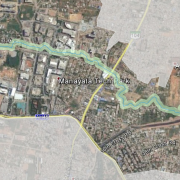Data Driving Problems?
Post by Jonathan Slakey, MPP Candidate ’15, who was in Vijayawada, India this summer
It’s been a whirlwind of a trip, but my time with the Association of Relief Volunteers (ARV) is over. The reality of organizing and funding a local NGO is much more difficult and time-consuming than I could have imagined from the classrooms of the Luskin School. Notions of data-driven analysis were often difficult or impossible to apply in the uncertain environment ARV finds itself. Much of what I saw at ARV seems to be the result of accepting and adapting to an unpredictable and very different set of challenges than are common in the US.
It’s not often in Los Angeles that you are sent home from the office early because the beehive outside is about to get smoked out. Nor have I ever experienced a board meeting being interrupted to investigate a snake in the office. Working without power and internet for hours on end was common at the ARV office, whereas the Luskin School is always awash in wireless internet. And ARV’s work was often interrupted by parades of funeral-goers, complete with clarinet-like wind instruments and drums, as the dead were carried off to the nearby crematorium.
ARV’s staff have a lot to keep in mind on top of the regular nonprofit responsibilities more typical in the US. In order to provide services to Dalit and tribal communities, ARV staff have to overcome these unexpected distractions. But when it comes to convincing the international community of ARV’s value, that’s no excuse. Potential investors are rarely sympathetic to the extra challenges local organizations are facing.
Public programs in the US especially have come to respect and depend on data. At the Luskin School for example, Public Policy students come to accept that public programs can only be held accountable and their effectiveness understood if good data is gathered. But that’s a high hurdle for many public programs doing genuinely good work. After all, Professionals with a doctorate in a subject spend years teasing out measures that allow for a thorough analysis.
Ravi, ARV’s founder, has a Masters in Social Work. He’s spent his entire career working with impoverished and discriminated communities. In his eyes, there’s no need to conduct a data-driven study to understand what services communities need. The communities themselves are his best source of information. Ravi and his staff meet regularly with village leaders to discuss their most pressing issues. He and the rest of ARV’s staff understand the government bureaucracy and help villages organize to demand their rights. And while he does take fairly meticulous records, little of it is functional for analysis.
Although my understanding of modern statistical methods is limited, I can understand the argument that having data on the populations ARV serves is important. At the very least, international funding is tied to an approach governed by quantifiable results. But is it actually cost-effective for small organizations with little capital like ARV to design and run a quantitative analysis? I can recognize that international donors want to be sure that their dollars are being spent well. But that expectation leaves countless local organizations in the lurch, struggling to provide much-needed services in areas where a culture of philanthropy may not exist. In my last week with ARV, I gave a presentation on how helpful even a simple survey of their populations could be. The staff seemed to agree with the presentation’s premise. Amidst all the daily challenges ARV faces as they strive to fulfill their organization’s primary mission though, I wonder how realistic it is to expect a thorough survey.












